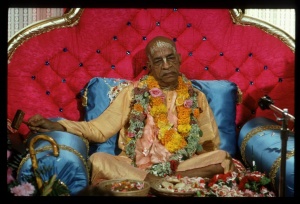CC Madhya 24.120 (1975): Difference between revisions
(Vanibot #0027: CCMirror - Mirror CC's 1996 edition to form a basis for 1975) |
(Vanibot #0020: VersionCompareLinker - added a link to the Version Compare feature) |
||
| Line 2: | Line 2: | ||
<div style="float:left">'''[[Sri Caitanya-caritamrta (1975)|Śrī Caitanya-caritāmṛta (1975)]] - [[CC Madhya (1975)|Madhya-līlā]] - [[CC Madhya 24 (1975)|Chapter 24: The Sixty-One Explanations of the Atmārāma Verse]]'''</div> | <div style="float:left">'''[[Sri Caitanya-caritamrta (1975)|Śrī Caitanya-caritāmṛta (1975)]] - [[CC Madhya (1975)|Madhya-līlā]] - [[CC Madhya 24 (1975)|Chapter 24: The Sixty-One Explanations of the Atmārāma Verse]]'''</div> | ||
<div style="float:right">[[File:Go-previous.png|link=CC Madhya 24.119 (1975)|Madhya-līlā 24.119]] '''[[CC Madhya 24.119 (1975)|Madhya-līlā 24.119]] - [[CC Madhya 24.121 (1975)|Madhya-līlā 24.121]]''' [[File:Go-next.png|link=CC Madhya 24.121 (1975)|Madhya-līlā 24.121]]</div> | <div style="float:right">[[File:Go-previous.png|link=CC Madhya 24.119 (1975)|Madhya-līlā 24.119]] '''[[CC Madhya 24.119 (1975)|Madhya-līlā 24.119]] - [[CC Madhya 24.121 (1975)|Madhya-līlā 24.121]]''' [[File:Go-next.png|link=CC Madhya 24.121 (1975)|Madhya-līlā 24.121]]</div> | ||
{{CompareVersions|CC|Madhya 24.120|CC 1975|CC 1996}} | |||
{{RandomImage}} | {{RandomImage}} | ||
==== TEXT 120 ==== | ==== TEXT 120 ==== | ||
| Line 11: | Line 10: | ||
<div class="verse"> | <div class="verse"> | ||
:akleśāṁ kamala-bhuvaḥ praviśya goṣṭhīṁ | :akleśāṁ kamala-bhuvaḥ praviśya goṣṭhīṁ | ||
:kurvantaḥ śruti-śirasāṁ śrutiṁ | :kurvantaḥ śruti-śirasāṁ śrutiṁ śrutajñāḥ | ||
:uttuṅgaṁ yadu-pura-saṅgamāya raṅgaṁ | :uttuṅgaṁ yadu-pura-saṅgamāya raṅgaṁ | ||
:yogīndrāḥ pulaka-bhṛto navāpy avāpuḥ | :yogīndrāḥ pulaka-bhṛto navāpy avāpuḥ | ||
| Line 20: | Line 19: | ||
<div class="synonyms"> | <div class="synonyms"> | ||
akleśām—without material trouble; kamala-bhuvaḥ—of Lord Brahmā, who took his birth from the lotus flower; praviśya—entering; goṣṭhīm—the association; kurvantaḥ—continuously performing; śruti-śirasām—of the topmost Vedic knowledge; śrutim—hearing; śruta-jñāḥ—who are expert in Vedic knowledge; uttuṅgam—very high; yadu-pura-saṅgamāya—for going back home, back to Godhead, to Dvārakā; raṅgam—to Raṅga-kṣetra; | akleśām—without material trouble; kamala-bhuvaḥ—of Lord Brahmā, who took his birth from the lotus flower; praviśya—entering; goṣṭhīm—the association; kurvantaḥ—continuously performing; śruti-śirasām—of the topmost Vedic knowledge; śrutim—hearing; śruta-jñāḥ—who are expert in Vedic knowledge; uttuṅgam—very high; yadu-pura-saṅgamāya—for going back home, back to Godhead, to Dvārakā; raṅgam—to Raṅga-kṣetra; yogīndrāḥ—great saintly persons; pulaka-bhṛtaḥ—being spiritually pleased; nava—nine; api—although; avāpuḥ—achieved. | ||
</div> | </div> | ||
| Line 27: | Line 26: | ||
<div class="translation"> | <div class="translation"> | ||
" 'The nine Yogendras entered Lord Brahmā's association and heard from him the real meaning of the topmost Vedic literatures-the Upaniṣads. Although they were already conversant in Vedic knowledge, they became very jubilant in Kṛṣṇa consciousness just by listening to Brahmā. Thus they wanted to enter Dvārakā, the abode of Lord Kṛṣṇa. In this way they finally achieved the place known as Raṅga-kṣetra.' | |||
</div> | </div> | ||
Latest revision as of 15:05, 27 January 2020

A.C. Bhaktivedanta Swami Prabhupada
TEXT 120
- akleśāṁ kamala-bhuvaḥ praviśya goṣṭhīṁ
- kurvantaḥ śruti-śirasāṁ śrutiṁ śrutajñāḥ
- uttuṅgaṁ yadu-pura-saṅgamāya raṅgaṁ
- yogīndrāḥ pulaka-bhṛto navāpy avāpuḥ
SYNONYMS
akleśām—without material trouble; kamala-bhuvaḥ—of Lord Brahmā, who took his birth from the lotus flower; praviśya—entering; goṣṭhīm—the association; kurvantaḥ—continuously performing; śruti-śirasām—of the topmost Vedic knowledge; śrutim—hearing; śruta-jñāḥ—who are expert in Vedic knowledge; uttuṅgam—very high; yadu-pura-saṅgamāya—for going back home, back to Godhead, to Dvārakā; raṅgam—to Raṅga-kṣetra; yogīndrāḥ—great saintly persons; pulaka-bhṛtaḥ—being spiritually pleased; nava—nine; api—although; avāpuḥ—achieved.
TRANSLATION
" 'The nine Yogendras entered Lord Brahmā's association and heard from him the real meaning of the topmost Vedic literatures-the Upaniṣads. Although they were already conversant in Vedic knowledge, they became very jubilant in Kṛṣṇa consciousness just by listening to Brahmā. Thus they wanted to enter Dvārakā, the abode of Lord Kṛṣṇa. In this way they finally achieved the place known as Raṅga-kṣetra.'
PURPORT
This is a quotation from the Mahā Upaniṣad.